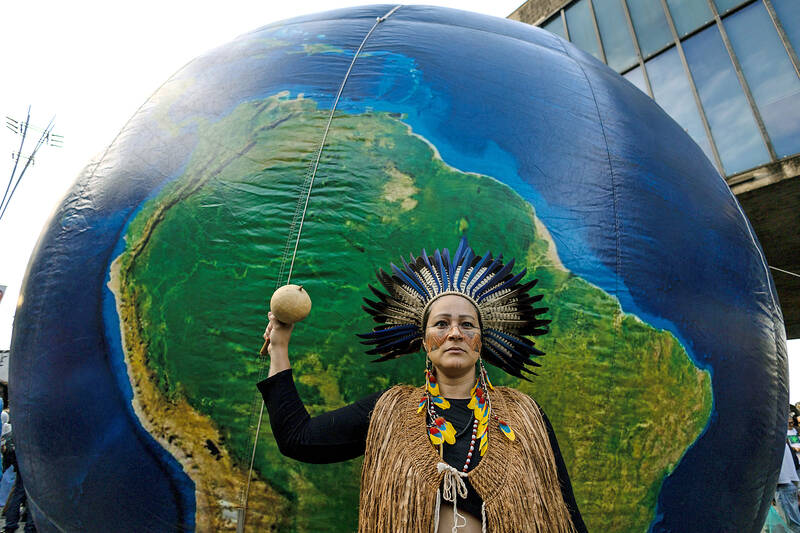Financing for clean energy in developing and emerging economies excluding China must increase sevenfold within a decade if global warming is to be capped at tolerable levels, the International Energy Agency (IEA) said yesterday.
To keep the Paris Agreement’s climate temperature goals in play, annual investment for non-fossil fuel energy in these countries would need to rise from US$260 billion to nearly US$2 trillion, the intergovernmental agency said in a report.
“Financing clean energy in the emerging and developing world is the fault line of reaching international climate goals,” IEA executive director Fatih Birol told journalists in a briefing on Tuesday.

Photo: AFP
The report comes on the eve of the two-day Summit for a New Global Financing Pact in Paris, which seeks to galvanize support for revamping the mid-20th century architecture governing financial flows from rich to developing nations.
Speeding the transition from dirty to clean energy, and helping the Global South cope with and prepare for the devastating effects of climate change are high on the summit agenda.
Virtually all of the nearly 800 million people lacking electricity and the 2.4 billion without access to clean cooking fuels are in poor and emerging countries.
Under current policy trends, one-third of the rise in energy use in these nations over the next decade would be met by burning fossil fuels, the main driver of global warming, the IEA said.
“Clean energy investments is increasing gradually — this is a good news,” Birol said.
“The bad news is that more than 90 percent of that increase in clean energy since the Paris Agreement in 2015 comes from advanced economies and China,” he said.
“Only 10 percent comes from the emerging and developing countries,” he added. “We need to change this trend.”
With China included in the calculation, private and public money pouring into renewables and other forms of carbon neutral energy would need to more than triple from US$770 billion last year to about US$2.5 trillion per year by the early 2030s.
Investment must remain at those levels until mid-century to help keep Earth’s average surface temperature rising “well below” 2°C, and 1.5°C if possible, the Paris climate treaty’s binding and aspirational targets respectively.
The potential for rapidly ramping up renewable energy is there, the report said.
At least 40 percent of the global solar radiation reaching the planet lands on sub-Saharan Africa, and solar energy is now the cheapest source of electricity generation across almost the entire world.
Yet, nearly 10 times more solar photovoltaic capacity was installed last year in China — about 100 gigawatts — than across the entire African continent.
Sunny sub-Saharan Africa generates less solar electricity than the Netherlands, Birol said.
Two-thirds of the finance for clean energy projects in emerging and developing economies excluding China would need to come from the private sector, the report said.
Today’s US$135 billion in annual private financing for clean energy in these economies must rise to about US$1 trillion a year within the next decade

LANDMARK CASE: ‘Every night we were dragged to US soldiers and sexually abused. Every week we were forced to undergo venereal disease tests,’ a victim said More than 100 South Korean women who were forced to work as prostitutes for US soldiers stationed in the country have filed a landmark lawsuit accusing Washington of abuse, their lawyers said yesterday. Historians and activists say tens of thousands of South Korean women worked for state-sanctioned brothels from the 1950s to 1980s, serving US troops stationed in country to protect the South from North Korea. In 2022, South Korea’s top court ruled that the government had illegally “established, managed and operated” such brothels for the US military, ordering it to pay about 120 plaintiffs compensation. Last week, 117 victims

China on Monday announced its first ever sanctions against an individual Japanese lawmaker, targeting China-born Hei Seki for “spreading fallacies” on issues such as Taiwan, Hong Kong and disputed islands, prompting a protest from Tokyo. Beijing has an ongoing spat with Tokyo over islands in the East China Sea claimed by both countries, and considers foreign criticism on sensitive political topics to be acts of interference. Seki, a naturalised Japanese citizen, “spread false information, colluded with Japanese anti-China forces, and wantonly attacked and smeared China”, foreign ministry spokesman Lin Jian told reporters on Monday. “For his own selfish interests, (Seki)

Argentine President Javier Milei on Sunday vowed to “accelerate” his libertarian reforms after a crushing defeat in Buenos Aires provincial elections. The 54-year-old economist has slashed public spending, dismissed tens of thousands of public employees and led a major deregulation drive since taking office in December 2023. He acknowledged his party’s “clear defeat” by the center-left Peronist movement in the elections to the legislature of Buenos Aires province, the country’s economic powerhouse. A deflated-sounding Milei admitted to unspecified “mistakes” which he vowed to “correct,” but said he would not be swayed “one millimeter” from his reform agenda. “We will deepen and accelerate it,” he

‘HYANGDO’: A South Korean lawmaker said there was no credible evidence to support rumors that Kim Jong-un has a son with a disability or who is studying abroad South Korea’s spy agency yesterday said that North Korean leader Kim Jong-un’s daughter, Kim Ju-ae, who last week accompanied him on a high-profile visit to Beijing, is understood to be his recognized successor. The teenager drew global attention when she made her first official overseas trip with her father, as he met with Chinese President Xi Jinping (習近平) and Russian President Vladimir Putin. Analysts have long seen her as Kim’s likely successor, although some have suggested she has an older brother who is being secretly groomed as the next leader. The South Korean National Intelligence Service (NIS) “assesses that she [Kim Ju-ae]